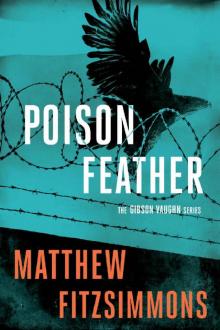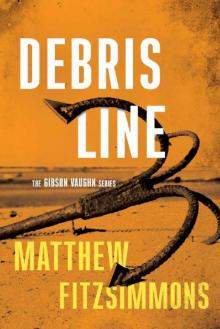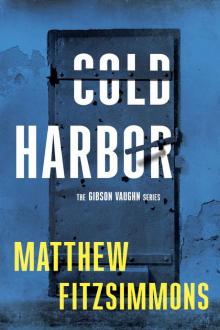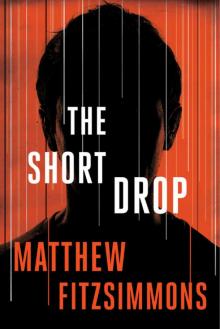- Home
- Matthew Fitzsimmons
The Short Drop Page 5
The Short Drop Read online
Page 5
Ordinarily, this was their main conference room, but it had been converted into a makeshift war room. Photographs, diagrams, maps, and notes were pinned neatly to a series of wheeled bulletin boards arranged along one wall. A photograph of Suzanne Lombard sat at the top of the center bulletin board, her immediate family arrayed below her like an inverted family tree. Vaughn’s eyes went straight to it, and an expression she couldn’t interpret passed over his face.
Arrayed beneath the family, staff members from Lombard’s Senate days, including Duke Vaughn, formed a row of their own. George’s photo was up there too. Completing the gallery, two blank placeholders hung side by side. One was labeled “WR8TH”—the anonymous chat-room handle of the person or persons with whom Suzanne had communicated online prior to her disappearance. The second read “Tom B.” A line connected the pair and a question mark hung between.
Abe took a seat at the head of the table. Hendricks and Vaughn followed suit while Rilling scurried around like a frantic mother hen.
“Michael. Please. Housekeeping can wait,” Abe said.
“Yes, Mr. Abe. Sorry.”
Abe forced himself to chuckle. “And stop apologizing for working hard.”
Jenn appreciated her boss’s effort, but no amount of praise was going to unwind Mike Rilling. She wasn’t convinced a bottle of Xanax and a straitjacket would do the trick. Rilling was overworked, tightly wound, and committed to the belief that he was deeply, tragically underappreciated.
“Michael, this is Gibson Vaughn,” George said. “He’s going to consult on the Lombard case. Gibson, this is Michael Rilling, our IT director.”
Rilling shook Vaughn’s hand limply and shot him a canine territorial look. Gibson either missed it or played it off.
“I’m going to have Jenn bring you up to speed,” Abe told Vaughn. “Fill in some of the blanks. Sometimes it’s helpful to retrace familiar terrain. You’ll find all of it covered in the file.”
Jenn pushed a thick binder across the conference table to Vaughn. “Suzanne Lombard” was typed neatly along the binding and on its cover; inside, it contained an overview of Suzanne Lombard’s disappearance and the subsequent investigation. A lot of it consisted of internal FBI documents, photographs, and memorandum, all impressively thorough. Abe might have fallen out with Benjamin Lombard, but he carried some serious weight of his own.
Vaughn regarded it warily and rubbed hard at a spot behind his ear. Every mention of Suzanne Lombard seemed to cause him to recoil and withdraw a little further inside himself. What was it? Guilt? Remorse? Fear? Was it fear? He caught her looking at him and smiled like someone trying to be friendly to a dentist prepping him for a root canal.
An overhead projector flared to life, and a screen descended from a wall-mounted casing. A photograph of Suzanne filled the screen. There had been no shortage of photos to choose from. The Lombards were a remarkably handsome family, photographs with the inner circle de rigueur at every get-together. The one up on the screen was cropped from one of the annual Christmas parties—Suzanne sitting on the floor at the grown-ups’ feet, smiling happily at the camera. Gibson Vaughn’s disembodied arm hung in the air beside Suzanne. Jenn had found a few without Vaughn—there weren’t many—but she’d chosen this one to gauge his reaction.
She regretted it now. The man looked seasick.
“Jenn, you have the floor,” Abe said.
She started to stand, thought better of it, and ran her tongue across her teeth. “How much do you know about Suzanne Lombard’s disappearance?”
“Apart from what they’ve been showing on the news for ten years?” Vaughn said. “Not a lot.”
“Were you ever questioned?” Hendricks interrupted. “After the abduction. We couldn’t find a record of it.”
“No,” Vaughn replied. “I was in jail at the time.”
“Dan makes a good point,” Jenn said. “If anything we know about Suzanne sounds wrong to you, inaccurate, speak up. You had a special relationship with her.”
Vaughn frowned. “Sure, but remember, I hadn’t seen her since my father died.”
“Understood,” Abe said. “But you never know.”
Jenn cleared her throat. “If no one objects, I thought we’d start at the beginning.” She paused to see if anyone did. “Okay, so as you all know, this July is the tenth anniversary of the disappearance. It was on the morning of Tuesday, July 22, that Suzanne Lombard, the daughter of Senator Benjamin Lombard of Virginia, ran away from home. Ran away from what, according to all observers, was a perfect and happy family. Does that jibe with your recollection?”
“And then some.”
“In the early stages of the investigation, the police and FBI worked from the theory that Suzanne had been snatched off the road around the family beach house outside the hamlet of Pamsrest, Virginia. Grace Lombard and her daughter often spent the entire summer there while the senator commuted back and forth between Pamsrest and DC.”
Pamsrest was a small community of the “everybody knows everybody” variety. Mom-and-pop stores, two ice cream parlors, a boardwalk, and an award-winning no-frills barbeque pit. A throwback to a simpler age that people got misty about but could never quite pinpoint in time—the kind of place where families felt safe enough to let their guards down.
“Definitely,” Vaughn said. “The last summer I spent down there, Bear was maybe twelve? And she already had free rein to come and go as she pleased.”
“Bear?” Hendricks asked.
“Sorry. I mean Suzanne. Bear was just what I called her.”
Hendricks made a note.
“Suzanne biked everywhere,” Jenn continued. “That summer she had a job at the local pool and usually left in the morning and was gone all day. This was before every kid had a cell phone. It wasn’t uncommon for Grace Lombard not to speak to her daughter during the day. So she didn’t get really worried until almost six in the evening. It took two calls to establish that Suzanne hadn’t shown up for work. Her third was to her husband in DC; Senator Lombard called the FBI. That got the ball really rolling. By morning, the town was inundated with law enforcement—local, state, and federal. By noon, the story broke nationally and Suzanne Lombard became the latest obsession of cable news.”
“Pays to be white,” Hendricks said.
Jenn nodded. That was inarguable. Social scientists referred to it as MWWS, or Missing White Woman Syndrome. Suzanne followed in the footsteps of Elizabeth Smart and Natalee Holloway—if you were going to go missing in America, it certainly helped to be white, female, and pretty. Throw in daughter of a US senator for good measure, and you had a recipe for America’s next obsession. The press descended on Pamsrest like a plague on Egypt. TV trucks formed a gleaming shantytown in a field on the edge of town. Any resident who cared to stand still for more than a few seconds was guaranteed to wind up on TV. The story ran round the clock for months on every media outlet in the country.
“On the afternoon of the second day, Suzanne’s bicycle was found two towns over in a covert of waist-high grass behind a general store. The area was canvassed multiple times, but no one remembered seeing Suzanne Lombard. Local law enforcement went to work on registered sex offenders in the region while the FBI explored the possibility that it was a politically motivated kidnapping. Of course, no ransom call ever came.”
Both Abe and Hendricks shifted in their seats. She went on before they could interrupt. She wanted to get through the old before broaching the new.
“The first break in the case came on day six. A college student named Beatrice Arnold called the FBI hotline to report she’d sold Suzanne Lombard snacks at the gas station where she worked in Breezewood, Pennsylvania.
“The Breezewood tape caused a seismic shift in the investigation and completely scrambled the assumptions of law enforcement. Suzanne Lombard hadn’t been snatched; she had run away. She had somehow traveled three hundred fifty miles f
rom the Virginia shore to the Pennsylvania line without drawing attention to herself. From the surveillance tape, three unassailable facts emerged: First, Suzanne was actively trying to conceal her identity. Second, she was waiting for someone. And third, in Suzanne’s mind at least, that someone was a friend.
“When it was presumed to be a kidnapping, no one had paid too much attention to Suzanne Lombard herself. She had just been an innocent girl in the wrong place at the wrong time. But when the Breezewood tape surfaced, the FBI took a bright light to the private corners of Suzanne Lombard’s life. Her environment, her belongings, her social circle were all inventoried and dissected.” Jenn paused. “I assume you’re with me so far, yes?”
Vaughn nodded.
“Okay, this is where we get into the part of the narrative that wasn’t shared with the media. So stop me if you have questions.”
Vaughn nodded again.
“So who was this ‘friend’ she met in Breezewood, and how did she know this individual? Initial interviews with Suzanne’s friends at the pool pointed to a boyfriend—a ‘Tom B.’ ” Jenn indicated the blank photo on the board.
“She had a boyfriend?”
“Does that surprise you?”
“A little, I guess. What do we know about him?”
“Not a lot. Her friends admitted covering for her at various points so she could leave work early to meet him. Suzanne’s parents were adamant there was no boyfriend, but a search of Suzanne’s room turned up a stash of love letters from him hidden in a bookcase.”
“And?”
“And nada. Law enforcement canvassed but failed to turn up a single Tom B. within a fifty-mile radius. They expanded the search to include variations on the name: Tom A., Tom C., Tom D., etc., but it was a dead end.”
“And he never came forward?”
Jenn shook her head. “But a new lead emerged when Suzanne’s laptop was searched. The hard drive had been wiped using Heavy Scrub, a program designed to erase data permanently.”
“Gibson, can you explain how it works?” George asked.
Jenn looked at her boss questioningly. George knew exactly how Heavy Scrub worked. He was the one who’d explained it to her. No doubt he had a reason for asking. Dealing with George was like playing chess with a grandmaster. He made her paranoid about her paranoia.
“Ah, sure,” Vaughn said. “Well, contrary to popular misconceptions, emptying a computer’s ‘trash’ only de-allocates it. It still exists on the hard drive, but the computer now has permission to overwrite the file should space be needed. However, an ‘erased’ file might exist for years depending on the user’s habits. Retrieving so-called erased data from a hard drive is simple. It’s been the downfall of many a would-be master criminal. Hence the need for programs like Heavy Scrub, which systematically overwrites a hard drive multiple times until any existing data becomes unrecoverable. Not the sort of thing your average fourteen-year-old would know to do.”
“And certainly not a teenager described as ‘technologically inept’ by her parents,” Jenn said.
“Which she quite clearly was,” Hendricks interjected. “Because while she installed and ran the program to cover her tracks, she shut the laptop’s cover before it was finished—”
Vaughn’s head turned sharply to Hendricks. “Which caused the computer to hibernate and stop Heavy Scrub midwipe,” he completed Hendricks’s sentence. “Bear botched it?”
“Correct,” Jenn said. “The laptop was taken to Fort Meade, which reconstructed as much of the data as it could—which turned out to be not much. The majority was garden-variety teenager: fragments of homework, essays, e-mails, etc. But an Internet relay chat client was found on her machine that her parents didn’t know anything about. And that none of her friends used.”
“I remember the FBI hunting high and low for WR8TH. Is that how the FBI knew about it?” Vaughn was sitting forward in his seat now.
“Yes. Someone using the username WR8TH befriended Suzanne in a chat room. WR8TH presented himself to her as a sixteen-year-old boy and became her confidant. What emerged was that he encouraged her to run away and helped her cover her tracks.”
“Did they get anywhere with it? The feds, I mean.”
“No, WR8TH was a dead end. The FBI made it public, as you know, but nothing ever came of it.”
“That doesn’t surprise me,” Vaughn said. “Internet relay chat is purposefully anonymous. No chat logs. Someone could choose a new username at each log-in. When I was getting into computers, IRC was what I used to trade tricks and strategies and code. Everyone was paranoid that the FBI had snitches lurking around in chat.”
“They did,” Abe said.
“So I had like twenty different usernames that I cycled through. If WR8TH was careful, it would be almost impossible to track him back to a source.”
“And that’s exactly what happened. Despite thousands of tips,” Jenn said. “Not one of them led to the person or persons behind WR8TH. Ironically, it wasn’t that the FBI couldn’t find any mention of WR8TH on the Internet; quite the opposite. It turned out to be an incredibly common username online. There are hundreds of variations of it in online gaming alone.”
Jenn went on to the FBI’s speculative and relatively generic profile of Suzanne’s abductor. Speculative because, apart from the fragments of chat recovered from Suzanne’s computer, they had nothing to go on other than the circumstances of the crime.
“The assumption was, and still is, that the perp was highly organized and probably between thirty and fifty. He was too smooth, confident, and thorough to be a novice. Young offenders are impulsive and stupid. This one was patient and cunning. Most likely, he was an experienced predator with a long history—Suzanne would not have been his first.”
“How did they reach that conclusion?”
“The perp was able to pass himself off convincingly as a teenage boy, which suggested he was extremely empathetic and skilled in social situations. It’s not easy to fool a teenager. The FBI doubted he had ever been arrested because pedophiles rarely vary their methods once they find one that works. Just to be sure, they scoured cold cases for his MO—nothing.
“WR8TH also knew his way around computers and how to avoid leaving a trail for law enforcement. His home, likely a freestanding house, afforded him some privacy, which also suggested he had a job and was able to function normally in public without drawing suspicion to himself.
“When the investigation went cold two years later, the prevailing theory was that the perp hadn’t known who Suzanne Lombard really was. There was nothing to indicate that she had revealed her identity to him online, and it was the FBI’s belief that the perp had panicked when he realized who he had abducted. There is a high probability that he killed her, dumped the body, and moved on to less dangerous quarry.”
Vaughn was staring at her. Those green eyes burning right through her.
“Where’s the bathroom?” he asked, standing and leaving before anyone could answer. The conference room door swung closed behind him.
“Smooth, Charles,” Hendricks said and dropped his pen on the table for effect.
“Fuck you, Dan. I didn’t know he was going to be such a girl about it.”
Rilling got busy typing something on his computer. George cleared his throat, and they both fell silent. Hendricks laughed. She looked at him, expecting to be reprimanded. Instead, her boss was smiling at her.
“He cares about Suzanne. Even more than I’d hoped. That’s good.”
“Yes, sir.”
“But how about we go easy on it from here on out.”
Vaughn came back but not all the way into the room. He stood in the doorway, one foot in, one foot out. He’d splashed water on his face sloppily and the front of his shirt looked wet.
“Look, George,” he said. “I appreciate the job offer, but if you expected me to see something and tell
you who WR8TH is, I’m sorry. I hadn’t seen Suzanne in a while. I wish I could help. Believe me. But I’m not going to see anything the FBI missed. I’m sorry,” he said again, and looked it. “You can have your money back. I’m sorry I wasted your time.”
Abe smiled. “No, Gibson. We don’t expect anything of the kind.”
“Then what?”
“Jenn?” Abe said.
Vaughn’s eyes leapt to her.
“WR8TH has made contact,” she said.
CHAPTER EIGHT
Fred Tinsley slowly spun his scotch glass on the bar and cast a malevolent eye toward his cell phone. He was waiting for a call. He didn’t know when it would come or who would be calling, but none of that concerned him. Whether the call came now or four hours from now made no difference. He wasn’t sure anymore that there was a difference.
His wristwatch claimed he had been waiting at the bar for three hours and twenty-seven minutes. Tinsley took it on faith that was the case. It was an expensive watch, purchased precisely for its world-renowned accuracy. And he relied on it, because he had long ago lost his ability to perceive the passage of time. A minute, an hour, a year—it all felt the same to him. Time is, so the great man had said, relative. Tinsley agreed wholeheartedly. Measuring one’s life in terms of days was purposeless. He could still feel his heartbeat in his chest, still taste the breath from his lungs. He yet lived, and that was the only measure of time that truly mattered.
The bar was one of those upscale establishments that had more scotches than beers. The barstools didn’t even wobble. Classy. Tinsley didn’t care for the kind of people it attracted—busy, nattering people who congregated like flies on the stiffening corpse of their day—but he appreciated the comprehensive selection of fine scotch.
Lately, he’d become enamored of Oban 14 year—a thick, peaty scotch. Although he’d never tasted it, Tinsley liked the way the smoky flavor clung to his nostrils. It smelled like the earth. He didn’t drink, but if he was required to wait in a bar, then he preferred to order something he could respect. The original distillery had been built in 1794, and to Tinsley it showed. It took patience and a painstaking attention to detail to perfect a skill. But most of all it took time.

 Cold Harbor
Cold Harbor Poisonfeather (The Gibson Vaughn Series Book 2)
Poisonfeather (The Gibson Vaughn Series Book 2) Debris Line (Gibson Vaughn)
Debris Line (Gibson Vaughn) Cold Harbor (The Gibson Vaughn Series Book 3)
Cold Harbor (The Gibson Vaughn Series Book 3) The Short Drop
The Short Drop